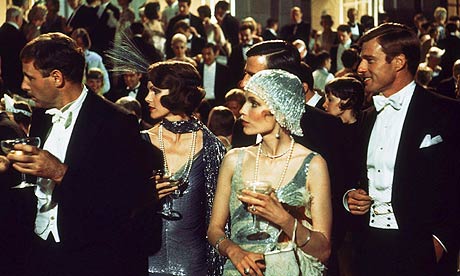Not So Great?
Baz Luhrman's The Great Gatsby opens today. I'm not sure if I'm up to it. In fact, The Great Gatsby strikes me as essentially unfilmable. The plot isn't much--what makes the book a classic is its elegant sentences and polished tone, and its sense of longing, reinvention, uncertainty and sadness. It's something a film probably can't capture. Certainly none has so far, and I'm not sure if a Baz bash will do it. Having the film out, however, makes we want to read the book again.
I haven't looked at it in years. And now here's a piece by Kathryn Schulz in Vulture saying I shouldn't.
It is the only book I have read so often despite failing—in the face of real effort and sincere intentions—to derive almost any pleasure at all from the experience
[....] I find Gatsby aesthetically overrated, psychologically vacant, and morally complacent
[....] None of its characters are likable. None of them are even dislikable, though nearly all of them are despicable.
I don't disagree entirely with everything she says, but I think she mostly misses the point. Yes, the characters are empty, and the relationship between Gatsby and Daisy isn't fleshed out, but this is a book about hopes that crash into emptiness. Fitzgerald is able to capture a mood, and have great set pieces, without exploring the inner lives of his characters--if anything, this might upset the careful balance of tone. He decided to set things at a remove, reflecting on American life of the time (and still today) by letting quiet voyeur Nick Carraway narrate.
Schulz complains that Fitzgerald is preaching too obviously, and worse, has the wrong lesson--he's more troubled by the pleasures of the rich than the immorality. He's also hypocritical, personally liking the things he's condemning.
That’s an interesting tension, common to most of us and great fodder for fiction. But rather than explore it, Gatsby enacts it. As readers, we revel in the glamorous dissipation of the rich, and then we revel in the cheap satisfaction of seeing them fall. At no point are we made to feel uncomfortable about either pleasure, let alone their conjunction.
"Enact it" rather than "explore it"? I'm not sure if I see the difference--it sounds like Schulz wants the book to be more obvious, yet complains it's too obvious at the same time. In any case, I think the book is more equivocal. Fitzgerald isn't setting out to make us seethe, or sympathize, but watch and understand (as well as we can).
Maybe the game was up when Schulz admitted she read the novel a bunch of times but derived no pleasure. Why bother, then? She so busy trying to be engaged that she misses the amazing journey of a small group of souls in a strange yet familiar world who flicker alive for a short period before they go in directions they can't avoid.
Now I definitely want to read it again. It can't be that good, can it?




1 Comments:
Here's 10 dollars- go buy ten more dogs.
Don't know why buts its favorite scene from the book- that and TJ Eckleburg are what I really remember 30 years later.
Post a Comment
<< Home